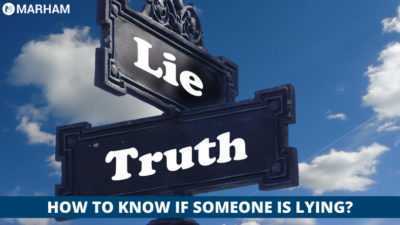Humans are prone to lying and deception then How To Know If Someone Is Lying? Until recently, there had been little actual research into how frequently people lie. According to a 2004 Reader’s Digest poll, up to 96 percent of people admit to lying at least occasionally. One national study told in 2009 surveyed 1,000 U.S. adults and discovered that 60% claimed they did not lie at all. Instead, the researchers discovered that approximately half of all lies were told by only 5% of all subjects.
According to the study, while prevalence rates may vary, there is most likely a small group of extremely prolific liars. The truth is that most people will lie from time to time. Some of these lies are white lies designed to protect the feelings of others (“No, that shirt does not make you look fat!”). In other cases, the lies can be far more serious (for example, lying on a resume) or even sinister (covering up a crime). SO, LETS SEE; how you may identify a lie.


Lying Can Be Hard to Detect
People are surprisingly poor at detecting deception. One study, for example, discovered that people could only detect lying 54 percent of the time in a lab setting—hardly impressive when compared to a 50 percent detection rate by chance alone. Clearly, behavioural differences between honest and lying people are difficult to distinguish and quantify.
Researchers have attempted to discover various methods of detecting lies. While there may not be a single, obvious indicator of dishonesty (like Pinocchio’s nose), researchers have discovered a few useful indicators. Detecting a lie, like many other things, often boils down to one thing: trusting your instincts. You may be able to improve your ability to detect lies by learning what signs to look for and how to pay attention to your own gut reactions.
Discuss your confusion with a psychologist right now through Marham.
Signs of Lying
Psychologists have used research on body language and deception to assist law enforcement officers in distinguishing between the truth and lies. UCLA researchers conducted research on the subject as well as analysed 60 studies on deception in order to develop recommendations and training for law enforcement. Their findings were published in the American Journal of Forensic Psychiatry.
Red Flags That Someone May Be Lying
- Among the potential red flags identified by the researchers that may indicate deception are:
- Being vague; providing few details
- Repetition of questions before answering
- Speaking in sentence fragments
- Failure to provide specific details when a storey is challenged
- Grooming behaviours such as playing with hair or pressing fingers to lips
While detecting deception is never easy, according to lead researcher R. Edward Geiselman, quality training can improve a person’s ability to detect lies: “Many people believe they can detect deception without training, but their perceptions are unrelated to their actual ability. Quick, insufficient training sessions cause people to over-analyze and perform worse than if they trust their gut instincts.”


Tips For How To Know If Someone Is Lying?
If you suspect that someone is not telling the truth, there are a few strategies you can employ to separate fact from fiction. To know in more detail consult with an expert.
Don’t Just Rely on Body Language
People frequently focus on body language “tells,” or subtle physical and behavioural signs that reveal deception, when it comes to detecting lies. While body language cues can occasionally hint at deception, research indicates that many expected behaviours are not always associated with lying.
Howard Ehrlichman is a psychologist who has been studying eye movements since the 1970s, discovered that they do not indicate lying at all. In fact, he claims that shifting eyes indicate that a person is thinking, or, more precisely, that he or she is thinking about something.
- Concentrate on the Correct Signals
- According to one meta-analysis, while people frequently rely on valid cues for detecting lies, the problem may stem from the weakness of such cues as deception indicators in the first place.
- Some of the most accurate deception cues that people do notice are:
- Vagueness: If the speaker appears to intentionally leave out important details, it is possible that they are lying. Vocal uncertainty: If a person appears unsure or insecure, they are more likely to be accused of lying.
- Indifference: Shrugging, lack of expression, and a bored posture can be signs of lying because the person is attempting to avoid conveying emotions and potential tells.
- Thinking too much: If the person appears to be thinking too hard to fill in the details of the storey, it is possible that they are deceiving you.
The takeaway here is that, while body language can be beneficial, it is critical to pay attention to the right signals. Some experts, however, believe that relying too heavily on certain signals may impair one’s ability to detect lies.


Request that they tell their story in reverse
Detecting lies can be viewed as a passive process. People may believe that they can spot obvious “tells” by simply observing the potential liar’s body language and facial expressions. You can get better results if you take a more active approach to uncovering lies.
According to some studies, asking people to tell their stories in reverse order rather than chronological order can improve the accuracy of lie detection. As cognitive load increases, verbal and nonverbal cues that distinguish between lying and telling the truth may become more visible. Lying requires more mental effort than telling the truth. When cognitive complexity is increased, behavioural cues may become more visible.
Trust Your Gut Feelings
Your instinctive reactions may be more accurate than any conscious lie detection you attempt. In one study, 72 people were asked to watch videos of interviews with fictitious crime suspects. 11 Some of these suspects had stolen a $100 bill from a bookshelf, while others had not, but they were all instructed to tell the interviewer that they had not taken the money. Similarly to previous studies, the participants were unable to detect lies consistently, correctly identifying liars 43 percent of the time and truth-tellers 48 percent of the time.


Consult with a Psychologist right now
Book an appointment now, to answer all your queries related to something that’s bothering you either if its about someone who is lying. You can book an appointment with the BEST Psychologists in Pakistan through Marham by calling at Marham helpline: 0311-1222398 or by online booking facility through the website or Marham mobile app.
Can’t Find The App?
| Android | IOS |
|---|---|
  |
  |
FAQ’s
What are the 5 signs that someone is lying?
- Alteration in Speech Patterns
- Irregular speech is one telltale sign that someone is not telling the whole truth.
- The Use of Incongruent Gestures
- Not Saying Enough
- Saying Too Much
- An Unusual Change in Vocal Tone
How can you tell if someone is lying?
- Determine the person’s starting point.
- Pay attention to the tone and pacing of their voice.
- Keep an eye on their eyes and body language, but be aware that there are other indicators.
- Keep an eye out for behavioral inconsistencies.
What are the 4 types of lies?
There are four types of lies, which can be distinguished by the use of four colors: grey, white, black, and red.

